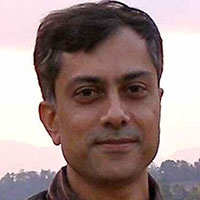Contributor : Profile
E. Somanathan received his Ph.D. in economics from Harvard in 1995 and taught at Emory University and the University of Michigan at Ann Arbor before joining the Indian Statistical Institute, Delhi where he is a Professor in the Planning Unit. His current research is in environmental and development economics. Ongoing research projects include the impact of global warming and aerosols on Indian agriculture and the distribution of income, and game-theoretic modeling of climate policies. Recent publications include Effects of Information on Environmental Quality in Developing Countries, (2010) Review of Environmental Economics and Policy, 4(2): 275-292, and “Decentralization for cost-effective conservation” (2009) with R. Prabhakar and B.S. Mehta, Proceedings of the National Academy of Sciences, 106(11): 4143-4147. He is a Co-ordinating Lead Author for Working Group III of the Fifth Assessment Report of the Intergovernmental Panel on Climate Change.
Posts by E. Somanathan
Economics and the environment
Published in February 2021 by the UK government, the ‘Dasgupta Review’ calls for changes in how we think, act and measure economic success to protect and enhance our prosperity and the natural wor...
-
 Partha Dasgupta
Partha Dasgupta  E. Somanathan
E. Somanathan  21 December, 2021
21 December, 2021
- Podcasts
Economics and the environment
Published in February 2021 by the UK government, the ‘Dasgupta Review’ calls for changes in how we think, act and measure economic success to protect and enhance our prosperity and the natural wo...
-
 Partha Dasgupta
Partha Dasgupta  E. Somanathan
E. Somanathan  20 December, 2021
20 December, 2021
- Videos
Covid-19: Escaping the economic dangers
As long as the spread of Covid-19 is not controlled in India, there is a threat of new complete or partial lockdowns in response. In this post, E. Somanathan contends that any further lockdown risks i...
-
 E. Somanathan
E. Somanathan  01 June, 2020
01 June, 2020
- Perspectives
A tribute to Marty Weitzman
Prof. Martin Weitzman who was among the most influential economists in the world passed away on 27 August 2019. His work on the uncertainty about how bad the impacts of a changed climate could be has ...
-
 E. Somanathan
E. Somanathan  07 October, 2019
07 October, 2019
- Perspectives
The simple economics of clean air
One of the main reasons why north-western India chokes on smog every November is the burning of residue from the rice crop by farmers. In this article, Somanathan and Gupta contend that public auctio...
-
 Ridhima Gupta
Ridhima Gupta  E. Somanathan
E. Somanathan  01 December, 2017
01 December, 2017
- Perspectives
Happy Seeder: A solution to agricultural fires in north India
It is believed that much of the pollution in Delhi in November every year originates in the neighbouring states of Punjab and Haryana where farmers burn their fields to dispose of crop residue. This ...
-
 Ridhima Gupta
Ridhima Gupta  E. Somanathan
E. Somanathan  12 November, 2016
12 November, 2016
- Articles
Coal and the climate change debate
In the run-up to the Paris Climate Summit, there has been a growing call among advanced nations to phase out fossil fuels. In this article, Arvind Subramanian, Chief Economic Adviser, Government of I...
-
 Milind Murugkar
Milind Murugkar  E. Somanathan
E. Somanathan  Arvind Subramanian
Arvind Subramanian  03 December, 2015
03 December, 2015
- Perspectives
Pricey diesel
India was recently ranked 174th out of 178 countries, on air pollution. A key contributing factor is diesel vehicles. This column shows that diesel subsidies benefit the rich more than the poor, and ...
-
 E. Somanathan
E. Somanathan  31 March, 2014
31 March, 2014
- Articles
Eliminating Delhi's November smog
Around this time every year, the air in Delhi becomes almost unbearable. As politicians and the press point fingers, this column offers up a happy solution.
-
 Ridhima Gupta
Ridhima Gupta  E. Somanathan
E. Somanathan  14 December, 2012
14 December, 2012
- Articles
Exploratory research on the impact of the Forest Rights Act, 2006, on deforestation, tribal welfare, and poverty, with implications for implementation
When the United Progressive Alliance came to power in the Indian general elections of May 2004, it published a Common Minimum Programme in which it promised to end the eviction of tribal and other for...
-
 Jean-Marie Baland
Jean-Marie Baland  Jagdish Krishnaswamy
Jagdish Krishnaswamy  François Libois
François Libois  E. Somanathan
E. Somanathan  01 July, 2012
01 July, 2012
- IGC Research on India




